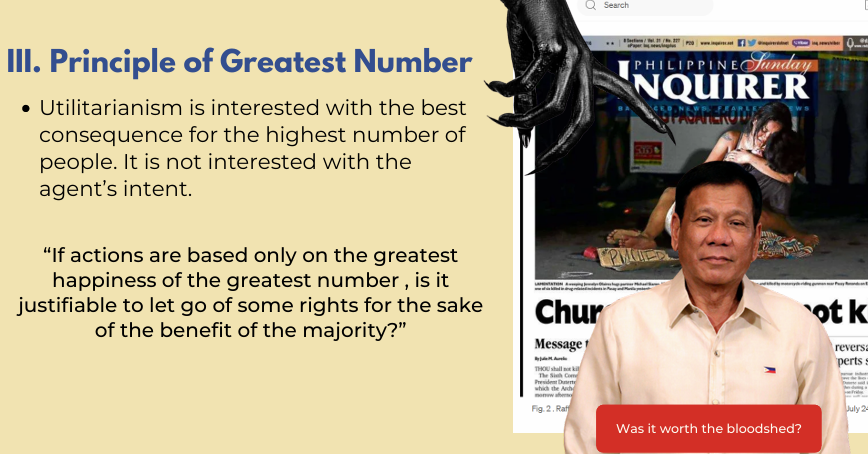Chapter 5 - Utilitarianism (included in finals)
1/35
There's no tags or description
Looks like no tags are added yet.
Name | Mastery | Learn | Test | Matching | Spaced |
|---|
No study sessions yet.
36 Terms
The Common Good
Principle of Utility
Principle of Greatest Number
Justice and Rights
Enumerate the four (4) parts of Utilitarianism
Jeremy Bentham
He argued that our actions are governed by two sovereign masters-- pain and pleasure.
Pain
Pleasure
Jeremy Bentham argues that our actions are governed by two (2) sovereign masters. What are these?
frfr
read lungs

Principle of Utility
The __________ is about our subjection to these sovereign masters; refers to the motivation of our actions as we avoid pain and desire for pleasure
Jeremy Bentham
Who wrote the greatest happiness principle of ethics (system of penal management/panopticon)?
System of Penal Management/Panopticon
Jeremy Bentham wrote the greatest happiness principle of ethics which is __________.
TRUE
TRUE or FALSE. John Stuart Mill supports Jeremy Bentham’s Principle of Utility.
Moral good = happiness = pleasure
What principle of Jeremy Bentham did John Stuart Mill support?
Action’s morality
For Bentham and Mill, the pursuit for pleasure are not just important principles - they are the only principle assessing an __________.
Felicific Calculus
What framework did Bentham create to evaluate pleasure and pain?
Felicific Calculus
This allows the evaluation of all actions and regardless of preferences and values.
FALSE
Pleasure and pain can only quantitatively differ from the experiences of pleasure and pain accordingly.
TRUE or FALSE. Pleasure and pain can only qualitatively differ from the experiences of pleasure and pain accordingly.
John Stuart Mill
Who is the friend and disciple of Jeremy Bentham who wrote the history of Roman Law, and the essay: Utilitarianism?
1861
When did John Stuart Mill wrote the essay: Utilitarianism?
TRUE
TRUE or FALSE. The essay Utilitarianism (1861) reflected the ethical theory of John Stuart Mill.
FALSE
John Stuart Mill dissents from Bentham’s single scale of pleasure--pleasures should be distinguished qualitatively not quantitatively.
TRUE or FALSE. John Stuart Mill dissents from Bentham’s single scale of pleasure--pleasures should be distinguished quantitatively not qualitatively.
FALSE
According to John Stuart Mill, there is a difference between higher intellectuals and lower base pleasures.
TRUE or FALSE. According to John Stuart Mill, there is no difference between higher intellectuals and lower base pleasures.
Principle of Greatest Number
Identify what part of Utilitarianism is being described:
This is not all about our individual pleasures, regardless how high, intellectual or noble it is, but it is about the pleasure of the greatest number affected by the consequences of our actions.
Principle of Greatest Number
Identify what part of Utilitarianism is being described:
It states that, “The standard is not the agent’s own greatest happiness but the greatest amount of happiness altogether. “
TRUE
TRUE or FALSE. Utilitarianism cannot lead to selfish acts.
FALSE
According to utilitarianism, if we are the only ones satisfied by our actions, it does not constitute moral good.
TRUE or FALSE. According to utilitarianism, if we are the only ones satisfied by our actions, it constitutes moral good.
TRUE
TRUE or FALSE. Utilitarianism is interested with the best consequence for the highest number of people. It is not interested with the agent’s intent.
frfr
read lungs

Justice
__________, as a respect for rights directed toward society’s pursuit for the greatest number.
Rights
__________, are a valid claim on society and are justified by utility. It is related to the interests that serve general happiness.
John Stuart Mill
“It is something guaranteed to him by society, what we say that he has the right to it.” This quote is from __________.
Justice
Rights
When your right as a person is violated, someone has to pay the price. This is where _______ and ________ enter the scene
FALSE
We are treated justly when our legal and moral rights are respectedTRUE
TRUE or FALSE. We are treated unjustly when our legal and moral rights are respected.
TRUE
TRUE or FALSE. John Stuart Mill thinks that it is commendable to endure legal punishment for acts of civil disobedience for the sake of promoting higher moral good.
FALSE
In a situation where conflict between moral and legal rights arise, moral rights take precedence over legal rights.
TRUE or FALSE. In a situation where conflict between moral and legal rights arise, legal rights take precedence over moral rights.
Thomas Aquinas
Who is the prominent person who contributed to the Natural Law?
Thomas Aquinas
He is a Dominican friar priest; the doctor of Roman Catholic Church/ Christian theology.
Summa Theologiae
This refers to a volumous work(Aquina’s Magnus Opus) that discusses many significant points in Christian theology.
Eternal Law
This refers to what God wills for creation, how each participant in it is intended to return to him.
Natural Law
This law emphasizes that human beings are given the gift to discern what is right and wrong because humans are the reflection of God.